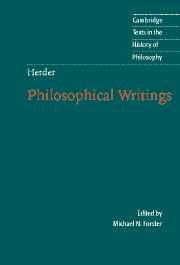Book contents
- Frontmatter
- Contents
- Introduction
- Chronology
- Further reading
- Note on the texts and translation
- Part I General Philosophical Program
- Part II Philosophy of Language
- Part III Philosophy of Mind
- On Thomas Abbt's Writings (1768) [selections concerning psychology]
- On Cognition and Sensation, the Two Main Forces of the Human Soul (1775) [preface]
- On the Cognition and Sensation of the Human Soul (1778)
- Part IV Philosophy of History
- Part V Political Philosophy
- Index
- Cambridge texts in the history of philosophy
On Thomas Abbt's Writings (1768) [selections concerning psychology]
Published online by Cambridge University Press: 05 June 2012
- Frontmatter
- Contents
- Introduction
- Chronology
- Further reading
- Note on the texts and translation
- Part I General Philosophical Program
- Part II Philosophy of Language
- Part III Philosophy of Mind
- On Thomas Abbt's Writings (1768) [selections concerning psychology]
- On Cognition and Sensation, the Two Main Forces of the Human Soul (1775) [preface]
- On the Cognition and Sensation of the Human Soul (1778)
- Part IV Philosophy of History
- Part V Political Philosophy
- Index
- Cambridge texts in the history of philosophy
Summary
A human soul is an individual in the realm of minds [Geister]: it senses in accordance with an individual formation [Bildung], and thinks in accordance with the strength of its mental organs. Through education these have received a certain, either good or negative, direction of their own according to the situation of circumstances which formed or deformed in the case in question. So in this way our manner of thought gets formed, becomes a whole body in which the natural forces are, so to speak, the specific mass which the education of human beings shapes. After a certain number of years of formation a later learning is seldom able, as I believe, to cause a new creation, seldom able to transform shape and mass, but all the more recognizably can it take effect on the surface through manifold phenomena, lend and take and emphasize coating, vestment, and bearing and propriety. My long allegory has succeeded if it achieves the representation of the mind of a human being as an individual phenomenon, as a rarity which deserves to occupy our eyes. But it would be even better if, through this allegory, as through a magical spell, I were also able to open our eyes to see, to observe, minds like corporeal phenomena.
Our psychology is still not yet far beyond childhood when it continues on its way through inferences and conjectures merely in accordance with the most familiar element which all human souls have in common, without paying attention to the peculiarities of individual subjects with the precision which the natural scientist applies in dissecting the bodies of animals in order to steal into the inner workshop of nature.
- Type
- Chapter
- Information
- Herder: Philosophical Writings , pp. 167 - 177Publisher: Cambridge University PressPrint publication year: 2002



